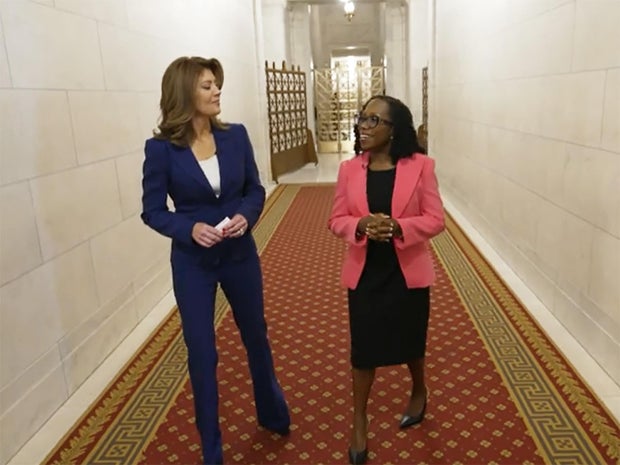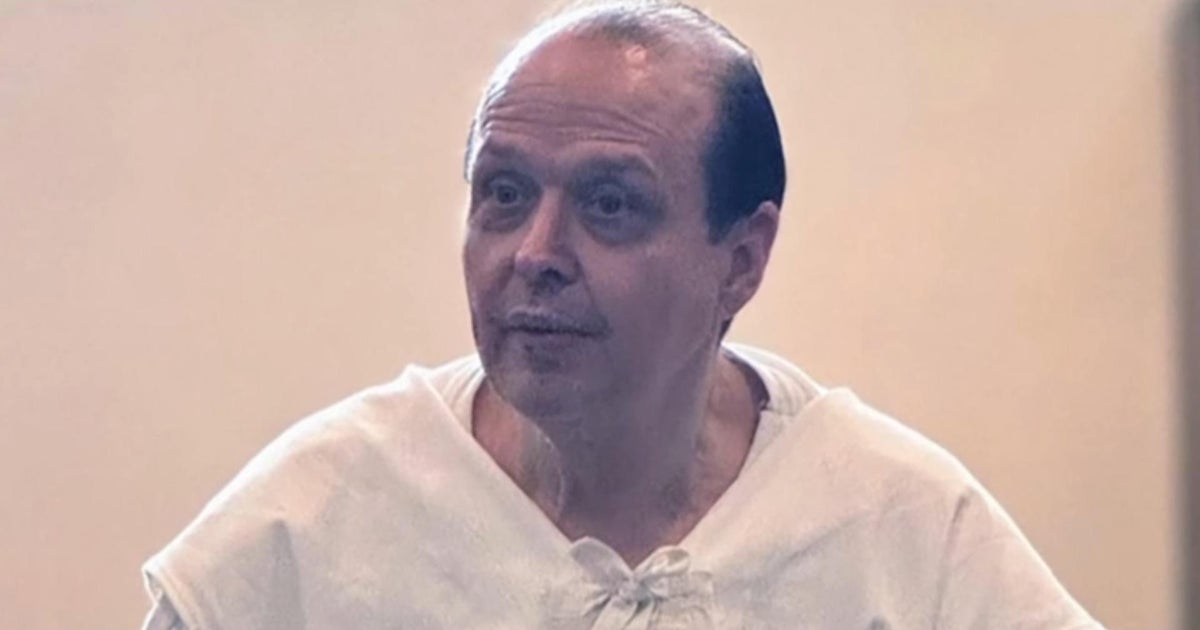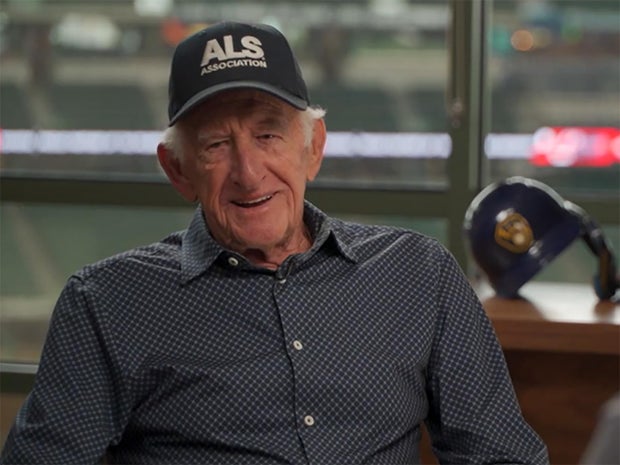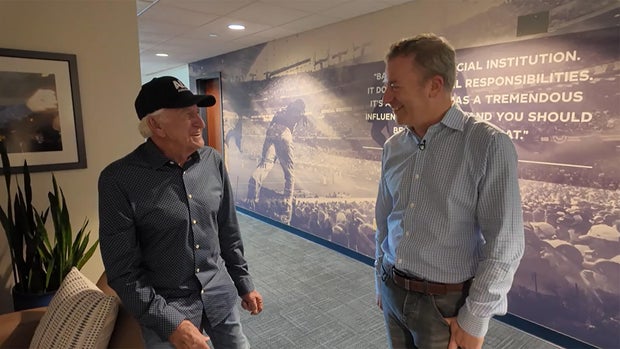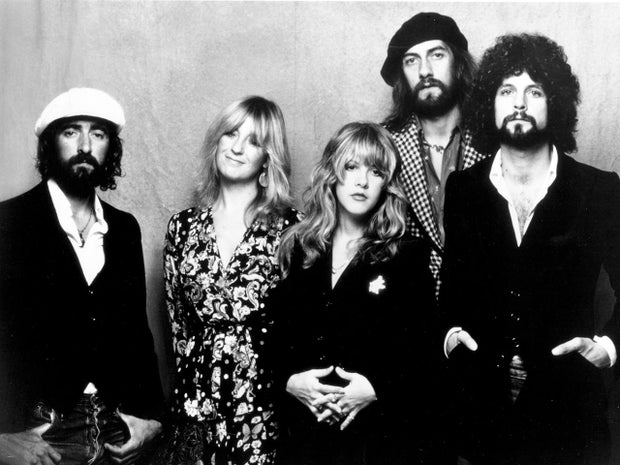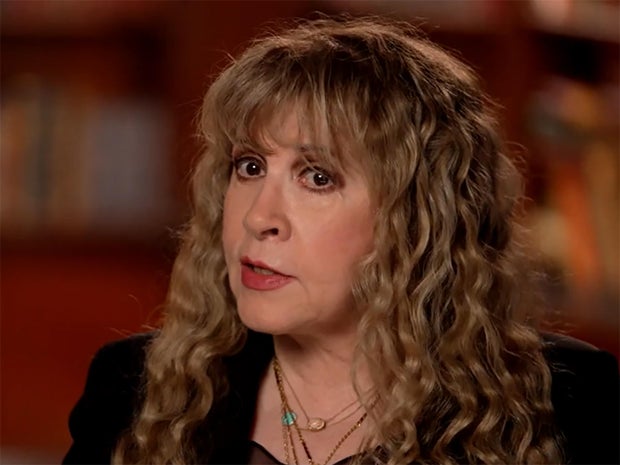CBS News
Highlights from Justice Ketanji Brown Jackson’s first interview since joining the Supreme Court

Walking the halls of the U.S. Supreme Court, Justice Ketanji Brown Jackson said, “I’m still just so floored being in this building.”
In 2022 Jackson was named by President Joe Biden to the Supreme Court. In the two years since, the court’s newest and youngest member has become the most prolific questioner from the Bench. She said she hasn’t changed since she was a district court judge. “I have a lot of questions!” she laughed. “I think it’s harder, obviously, when you’re one of nine than when you’re all alone. And there is an adjustment period that I think had to happen from my perspective. I wasn’t doing anything different. And maybe I should have been! But I have questions, and we have a very complicated legal system. And these issues are hard.”
CBS News
In her first interview since being confirmed to the Supreme Court, Jackson talked with “CBS Evening News” host and managing editor Norah O’Donnell about some of the court’s most divisive decisions, as well as her own journey to becoming the first Black Woman to sit on the nation’s highest court.
Here are some highlights from Jackson’s interview.
On presidential immunity
One of the most controversial decisions by the Roberts Court this term was in Trump v. United States, a case which has major implications regarding oversight of the chief executive and the powers wielded from the Oval Office.
The former president was indicted by a federal grand jury for his efforts to overturn Joe Biden’s election victory, including spreading knowingly false claims of “election fraud,” and leading the January 6th insurrection at the Capitol intended to obstruct the certification of the Electoral College ballots.
Trump appealed to the District Court in D.C. to dismiss the charges, claiming that he possessed “absolute immunity” from prosecution for actions taken in his capacity as president. The District Court denied his motion, which the D.C. Circuit affirmed. However, on July 1, the Supreme Court ruled, 6-3, that a president can be immune from criminal prosecution for “official acts” taken during their time in office.
Jackson, who joined those in opposition, wrote in her dissent that the opinion by the Court’s conservative members “breaks new and dangerous ground. Departing from the traditional model of individual accountability, the majority has concocted something entirely different: a Presidential accountability model that creates immunity—an exemption from criminal law—applicable only to the most powerful official in our Government. … In the end, then, under the majority’s new paradigm, whether the President will be exempt from legal liability for murder, assault, theft, fraud, or any other reprehensible and outlawed criminal act will turn on whether he committed that act in his official capacity, such that the answer to the immunity question will always and inevitably be: It depends.”
Jackson told O’Donnell, “I was concerned about a system that appeared to provide immunity for one individual under one set of circumstances, when we have a criminal justice system that had ordinarily treated everyone the same.”
As the case was returned to U.S. District Court Judge Tanya Chutkan, special counsel Jack Smith issued a superseding indictment of Trump, from a newly-impaneled grand jury, reiterating the four criminal charges in the case, but narrowing the scope of evidence. Trump accused the special counsel of election interference and demanded that the charges be dropped.
Asked if she was prepared for the 2024 election results to wind up before the Supreme Court, Jackson replied, “As prepared as anyone can be! … I think there are legal issues that arise out of the political process. And so, the Supreme Court has to be prepared to respond if that should be necessary.”
On ethics at the Supreme Court
Over the past decade there has been a crisis of faith in the nation’s highest court – from the partisanship that has colored the confirmation process, to ideologically-pitched decisions (such as the overturning of Roe v. Wade), to revelations about undisclosed gifts and luxury trips accepted by justices from wealthy donors.
According to a recent survey from Pew Research, less than half of Americans (47%) say they have a favorable view of the Supreme Court; 51% have an unfavorable opinion. The numbers are even more skewed when divided by party affiliation, with Democrats holding a 24% favorable view of the Court, vs. 73% among Republicans.
Justice Clarence Thomas, for one, has faced backlash for failing to disclose millions of dollars’ worth of travel and lodging from conservative donors, including billionaire Harlan Crow. (Thomas said he did not believe he had to report the travel under the court’s rules at the time.)
Asked if she felt it was appropriate for Thomas to have accepted an estimated $4,000,000 in trips, travel, and gifts over the past two decades, Jackson replied, “I’m not going to comment on other justices’ interpretations of the rules or what they’re doing.”
Jackson herself has disclosed receiving about $25,000 in gifts since joining the court (including Beyoncé concert tickets and a flower display from Oprah), as well as an advance of nearly $900,000 for her memoir.
Asked about her personal code of ethics, Jackson said, “I follow the rules, whatever they are, with respect to ethical obligations. And it’s important in my view to do so. It really boils down to impartiality. That’s what the rules are about. People are entitled to know if you’re accepting gifts as a judge, so that they can evaluate whether or not your opinions are impartial.”
President Joe Biden has proposed several reforms for the Supreme Court, from term limits, to a law requiring justices to disclose gifts, refrain from public political activity, and recuse themselves from cases in which they or their spouses have financial or other conflicts of interest.
“A binding code of ethics is pretty standard for judges,” said Jackson. “And so, I guess the question is, ‘Is the Supreme Court any different?’ And I guess I have not seen a persuasive reason as to why the court is different than the other courts.”
She said she would support an enforcement mechanism on a SCOTUS code of ethics (the current rules do not have one). “I am considering supporting it as a general matter. I’m not going to get into commenting on particular policy proposals. But from my perspective, I don’t have any problem with an enforceable code.”
On the meaning of her name
The title of Jackson’s new memoir, “Lovely One” (to be published Tuesday by Random House), has a special meaning for her – it’s the translation of her name.
“My aunt was in the Peace Corps in Africa when I was born,” she said. “My parents really wanted to honor our heritage, and asked her to send them a list of African names.”
Among them: Ketanji Onyika (her middle name), which translates as Lovely One.
On her perseverance
Jackson’s parents, John and Ellery Brown, who grew up in the segregated South, had high hopes for their daughter, whom they raised in a middle class household in Miami.
“I was born within five years of the Civil Rights Act, the Voting Rights Act,” she said. “So, they were like, ‘Here’s our opportunity to make sure that our daughter can do all the things that we didn’t get to do!’ My parents had raised me to believe that I could do anything I wanted to do. That was my way of thinking about myself.”
She said her parents taught her to persevere: “My mother used to say, ‘Have you seen this being done before? Has anybody ever done this? Well, if they have, then you can do it, too.’ And that was the mindset that they really drilled into me—you keep going.”
That sense of perseverance was also instilled in her through a favorite poem, “The Ladder of St. Augustine” by Henry Wadsworth Longfellow, which taught the value of hard work: The heights by great men reached and kept were not attained by sudden flight, but they, while their companions slept, were toiling upward in the night. “That’s, like, my favorite summary of how I felt about work,” she said. “I was the person who was going to toil upward in the night, always.”
A natural orator, in high school she was a national speech and debate champion, with her sights on a career as a judge, declaring, “I want to eventually have a judicial appointment.”
“I had forgotten all about that, wanting to have a judicial appointment, but there it is, in my high school yearbook!” she laughed.
A Harvard Law graduate, Jackson clerked for Supreme Court Justice Stephen Breyer, and later worked as a federal public defender. (Jackson is the first public defender to sit on the Supreme Court.)
Asked about becoming the first Black female justice, Jackson said her story – one of breaking though barriers – was becoming less and less exceptional. “Which is really what progress means, when you go from never having seen or done this thing before, to seeing someone do it,” she said. “And then it’s happening more often. And then you feel like, ‘We’ve progressed. And it’s wonderful!'”
Watch more of Norah O’Donnell’s interview with Justice Ketanji Brown Jackson on “Person to Person,” streaming on Thursday, Sept. 5, at 8:30 p.m. ET on CBS News 24/7 and Paramount+.
For more info:
CBS News
A visit with “Mr. Baseball” Bob Uecker

Ever since Babe Ruth was waddling around the bases, there have been grim predictions about baseball’s future: Time has passed on the national pastime, too leisurely, too bucolic. Last year’s World Series TV ratings, and this season’s batting averages, both hit 50-year lows. Baseball, they say, is dying.
But never mind the current World Series between two of the game’s stalwarts, the New York Yankees and the Los Angeles Dodgers. Want to feel better about baseball’s health? Just go to a Milwaukee Brewers game.
There, in Major League Baseball’s smallest market, cheese curds sweat under floodlights, frozen custard unspools into batting helmets, hometown Miller flows liberally, and on the stadium’s second level is the most authentic Milwaukee touch of all: the broadcaster they call “Mr. Baseball.”
CBS News
In six undistinguished seasons as a catcher in the majors, Bob Uecker never played an inning for the Brewers. But during half a century as the team’s play-by-play announcer, he’s become equal parts mayor and mascot in the city of his birth, all the while declining offers from bigger markets – laying off pitches, as it were.
In the 1980s Yankees owner George Steinbrenner tried to recruit Uecker. “Steinbrenner sent a couple of people out to talk to me about joining the Yankees,” he said, “but I loved Milwaukee. Born and raised here!”
Uecker began his major league career in 1962 with the Milwaukee Braves before the franchise moved to Atlanta. “I was the first player from Milwaukee to ever be signed by the Braves,” he said. “I was also the first Milwaukee native to be sent to the minor leagues by the Braves!”
If Uecker’s on-field inadequacies hampered his playing career, they’ve provided some of his best material in a lengthy and lucrative second career as an actor and comedian. Employing a bone-dry wit, he made more than 40 appearances on Johnny Carson’s “Tonight Show.”
He said, “I did ‘Tonight Shows,’ you know, whenever they wanted. I would leave here on a Sunday afternoon, fly to L.A., do the Monday night show, take a red-eye back here, and be here for Tuesday’s game.”
Johnny Carson: “Give me, fast as you can, all the teams you’ve ever played with.”
Uecker: “Braves, Cardinals, Phillies, and the Braves again. Then, in June, I was with …”
The Carson guest spots led to a series of notable TV commercials, as well as a starring sitcom role, and perhaps most memorably as Harry Doyle, the perpetually blitzed announcer in the “Major League” movies. This past summer, at Milwaukee’s American Family Field, “Harry Doyle Bobblehead Night” brought the Uecker faithful out in force.
Asked his favorite “Bob Uecker line,” he replied, “‘Juuuuust a bit outside.’ That’s where my wife put me a lotta times!”
CBS News
Before serving 16 years as baseball’s commissioner, Bud Selig owned the Brewers, and, in 1971, hired Uecker, misguidedly, as a scout. Selig said it is “legitimately true” that Uecker wasn’t cut out to be a scout. “There were mashed potatoes on the damned scouting report. I couldn’t read it. He couldn’t read it,” he said.
So, Selig moved Uecker to the Brewers’ broadcast booth later that year.
Today there’s even a statue honoring Uecker, where else? In the very last row of the upper deck, behind a pole.
CBS News
But for all the stardom, all the gigs and gags, the late-night-laughs at his own expense, Uecker still fancies himself a player, says Brewers pitcher Brandon Woodruff: “He lets us know about his catching days. He’s one of us. He’s part of the team. And I think that’s why we embrace him so much, is that he’s on this ride with us. And that’s what makes it cool.”
According to Uecker, he has a bond with the players on the field: “I played the game. So, I know how hard it is. I know how tough it is to play this game. The game celebrations, when we win, that’s a big part of it, man, to be able to walk into that clubhouse and be with ’em.”
But baseball is cruel, and in Milwaukee, celebrations are short-lived. Earlier this month, with the Brewers just two outs from winning the National League Wild Card Series, the New York Mets came from behind on a dramatic home run.
On the radio, Uecker didn’t hide the hurt: “I’m tellin’ ya, that one … had some sting on it.”
The Brewers’ first World Series title will have to wait.
There’s speculation that the heartbreaking loss may have marked Uecker’s last game as an announcer. But as his 91st birthday nears, the man they call “Mr. Baseball” told us he doesn’t want to imagine his life without it.
“I don’t know what I would do, you know, with no more. If I think of no more baseball for me, I don’t know what that would be like, you know?” Uecker said. “I got out of high school and I joined the Army. And I signed a baseball contact. That’s been it, really!”
For more info:
Story produced by Robert Marston. Editor: Lauren Barnello.
CBS News
Ralph Fiennes on the provocation of acting

Watch CBS News
Be the first to know
Get browser notifications for breaking news, live events, and exclusive reporting.
CBS News
Stevie Nicks on “The Lighthouse,” her rallying cry for women’s rights

On a trip to New York City earlier this month to appear on “Saturday Night Live” for the first time since 1983, Stevie Nicks said she was scared to death. She said her first reaction when she got the call to appear on “SNL” was, “Absolutely not. Because I was terrified to do it, ’cause it goes out live!”
But she did appear on “SNL,” and her performance of “The Lighthouse” brought down the house.
She says the inspiration for her latest song, a rallying cry for women’s rights, struck a few months after Roe v. Wade was overturned, and it took her less than a day to write the song and record it.
Smith asked, “It takes some courage to step into the waters of the abortion debate. Why take the risk?”
“Because everybody kept saying, ‘Well, somebody has to do something. Somebody has to say something,'” replied Nicks. “And I’m like, ‘Well, I have a platform. I tell a good story. So maybe I should try to do something.’ I was also there. I was, been there, done that.“
Michael Ochs Archives/Getty Images
In the late ’70s, Nicks was on top of the world with the legendary band Fleetwood Mac. She’d broken up with her longtime partner and Fleetwood Mac bandmate Lindsey Buckingham, and she was romantically involved with Don Henley of The Eagles when she found out she was pregnant, and decided that, as a touring musician, being a mother was not in the cards.
In 1979 she terminated the pregnancy. “In my younger life, I’d already decided I didn’t want to have somebody have their feelings hurt all the time, and like, ‘When are you comin’ back?’ ‘Well, I don’t know. I’ll be back when I get back,’ you know?” Nicks said. “And not even having any idea how big that Fleetwood Mac was going to get in the future, you know? And this is, like, super personal and weird, so you know … you can edit this out if necessary.”
“I appreciate your sharing this story though,” said Smith.
“Well, and it’s a good story, too. I tell a good story!” Nicks said. “I got pregnant. And it was like, Why? I have an IUD. I am totally protected. I have a great gynecologist. How come this has happened? What the heck?“
“So you took all the precautions?”
“Yes. And I’m like, This can’t be happening. Fleetwood Mac is three years in. And it’s big. And we’re going into our third album. It was like, Oh no, no, no, no, no, no.“
Nicks said it would have “destroyed” Fleetwood Mac if she had had the baby: “Absolutely, because many reasons. I would’ve, like, tried my best to get through, you know, being in the studio every single day expecting a child. But mostly, having a child with Don Henley would not have gone over big in Fleetwood Mac, with Lindsey and me – we had been broken up for two or three years. It would’ve been a nightmare scenario for me to live through.”
Fleetwood Mac was a collection of stars, but Stevie Nicks was front-and-center. She was the one who wrote the band’s only #1 single in the U.S., “Dreams,” a song that is still a hit today on streaming.
But if “Dreams” is about heartache and vulnerability, Nicks’ new song is just the opposite: it’s about fighting for the same reproductive rights that she had.
Smith asked, “There are people who criticize your choice, condemn your choice. Anything you want to say to them?”
“I’d like to know, so are you just the few guys who are making the decisions for us?” Nicks replied.
CBS News
She said the choice, ultimately, “was mine. And you know what? If people want to be mad at me, be mad at me. I don’t care. Had I made the other choice, had I gone the other way, I’d have been a great mom. I went this way, and I’ve done great.”
Nicks would go on to new heights as a solo artist, becoming the first woman to be inducted into the Rock & Roll Hall of Fame, twice.
Of course Nicks has had her share of heartache as well. The woman she called her musical soulmate, Christine McVie, died in 2022, and Nicks was shattered.
“I wanted to go and step in, sit on her bed, and hold her hand, and sing ‘Touched By An Angel’ to her until I was sure she heard it,” she said. “And I didn’t get to. And I didn’t get to say goodbye to her.”
Nicks now ends her shows with a moving tribute to her best friend. She sings, but can’t bring herself to watch. “We have a really beautiful montage of her and me. I never turn around and look. I can’t, ’cause I’ll start to sob. And if I start to sob, then I won’t be able to finish the song. So, I just don’t look at it.”
CBS News
Nicks says that, although McVie is gone, she feels her presence with her all the time. She wears a necklace containing some of McVie’s ashes. “A little bit of her,” Nicks said. “But as important as that is, she’s in my heart,” she said.
Nicks says she really doesn’t care whether her new song, “The Lighthouse,” is a hit or not; she just wants people to listen. “Poets write what they write, and poets should not be censored. Writers should not be censored. This song should not be censored. It should go out into the world and do what it’s gonna do, maybe change some minds. There is a God, and God gave me this talent to sing and write and dance. So, I’m doing my job.”
For more info:
Story produced by John D’Amelio. Editor: Steven Tyler.
See also:


